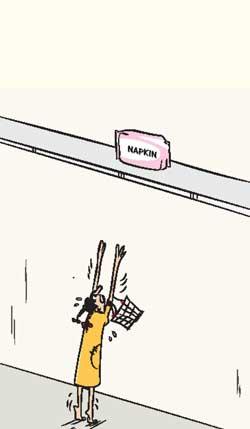23 Sep 2022 - {{hitsCtrl.values.hits}}
 Menstruation is an involuntary biological process. Therefore, access to sufficient menstrual hygiene products that meet specific biological and medical needs is a basic human necessity. However, Sri Lanka’s decision to tax sanitary napkins and menstrual hygiene products was once again brought to the limelight with concerns of absenteeism among adolescent girls and women in low-income settlements employed in the workforce. A study conducted by The Advocata Institute titled ‘Assisting Communities in Creating Environment and Nutrition Development (ACCEND) implemented in rural and plantation sectors in Matale, NuwaraEliya and Moneragala districts revealed that Sri Lanka’s absolute household period poverty rate is approximately 50%.
Menstruation is an involuntary biological process. Therefore, access to sufficient menstrual hygiene products that meet specific biological and medical needs is a basic human necessity. However, Sri Lanka’s decision to tax sanitary napkins and menstrual hygiene products was once again brought to the limelight with concerns of absenteeism among adolescent girls and women in low-income settlements employed in the workforce. A study conducted by The Advocata Institute titled ‘Assisting Communities in Creating Environment and Nutrition Development (ACCEND) implemented in rural and plantation sectors in Matale, NuwaraEliya and Moneragala districts revealed that Sri Lanka’s absolute household period poverty rate is approximately 50%.
Sri Lanka’s decision to tax sanitary napkins and menstrual hygiene products was once again brought to the limelight with concerns of absenteeism among adolescent girls......
Menstrual hygiene products :
An essential luxury
 The study further revealed that Sri Lanka’s imported menstrual products are taxed at 52% with border tariffs and the local VAT contributing to the overall tax rate. Sri Lanka’s border tariffs are a mixture of tariffs and a number of additional levies referred to as para tariffs. The increase in prices and the unaffordability they cause result in period poverty and the analysis finds that repealing the 52% tax or at the least reducing the tax on menstrual products would make it more accessible for low-income consumers.
The study further revealed that Sri Lanka’s imported menstrual products are taxed at 52% with border tariffs and the local VAT contributing to the overall tax rate. Sri Lanka’s border tariffs are a mixture of tariffs and a number of additional levies referred to as para tariffs. The increase in prices and the unaffordability they cause result in period poverty and the analysis finds that repealing the 52% tax or at the least reducing the tax on menstrual products would make it more accessible for low-income consumers.
Prior to September 2018 sanitary napkins and tampons were taxed at 101.2% under the HS code 96190010. In September 2018 the Ministry of Finance repealed the CESS component of this tax reducing the total tax rate to 62.6%. Further in December 2019 former President Gotabaya Rajapaksa introduced a tax cut programme which resulted in a reduction of VAT and the removal of the Nation Building Tax on all goods. This brought the total tax levied on menstrual products to 52%. The 2021 budget revised the general duties of sanitary napkins from 30%-15% and reimposed the CESS of 15%.
The study reveals that there are 5,355,092 women and girls of reproductive age between 15-49 years in Sri Lanka. The age cohort chosen for the study is 15-47 years as global literature cites 12-13 as the common age for menarche and the age between 42-51 with a mean of 47 as the age for menopause. The methodology adopted to calculate Sri Lanka’s household period poverty rate is the number of households with women of menstruating age which have not spent money on sanitary towels divided by the total number of households with at least one woman of menstruating age. The study reveals that Sri Lanka’s absolute household period poverty rate is approximately 50%. This means that around half of the households with women of menstruating age don’t report buying sanitary towels as part of their household expenditure.
At current market prices the cheapest sanitary napkin packet consisting of 10 pieces costs Rs. 125 as of April 2021. Therefore the lowest price per pad is Rs. 12.5. Assuming that on average a woman will have her period for five days and would require 3 pads per day a menstruating Sri Lankan woman would end up spending Rs. 187.5 for the duration of her period given that she buys the cheapest option available in the market. In the case of imported sanitary napkins a woman would end up spending between Rs. 298.05 to Rs. 621 per month and between Rs. 3576 to Rs. 7452 per year.
Even though activists opined that lack of access to menstrual products results in absenteeism among girls in school, the study states that there is a lack of evidence in this regard. Surveys that focus on this issue are often limited on sample size. These surveys also encounter additional challenges including the difficulty in identifying whether absenteeism is due to social stigma, lack of access to menstrual hygiene products, lack of access to adequate sanitation in school or pain related menstruation. Although it is difficult to quantify the direct impact of a sanitary napkin tax to education due to limitations in data, it has been noted that pain, discomfort and fear of staining a white uniform would negatively affect a girl’s overall school experience.
Govt. should remove taxes as a first step
-Dr. Amarasuriya
 National People’s Power MP Dr. Harini Amarasuriya said that the matter of period poverty is not only linked to the question of sanitary napkins. “Menstrual hygiene products shouldn’t be taxed at all. The government should prioritise on women’s health and sanitation while ensuring that women have access to menstrual products and that these needs are being met. Many women also suffer from health conditions linked to menstrual hygiene. We also need to change negative attitudes with regards to menstruation and menstrual hygiene products. As a first step, the government can start with removing taxes on menstrual products.”
National People’s Power MP Dr. Harini Amarasuriya said that the matter of period poverty is not only linked to the question of sanitary napkins. “Menstrual hygiene products shouldn’t be taxed at all. The government should prioritise on women’s health and sanitation while ensuring that women have access to menstrual products and that these needs are being met. Many women also suffer from health conditions linked to menstrual hygiene. We also need to change negative attitudes with regards to menstruation and menstrual hygiene products. As a first step, the government can start with removing taxes on menstrual products.”
Govt. decides to reduce certain taxes on sanitary napkins
-Geetha Kumarasinghe
 However, when contacted, the newly appointed State Minister of Women’s and Children’s Affairs Geetha Kumarasinghe said that the Treasury had informed the Finance Ministry to reduce taxes imposed on sanitary napkins. “I had to take immediate action on this matter and I had to inform the President about the matter. He had then informed the cabinet secretary to look into the matter. As such measures have been taken to reduce the CESS, Port and Development Levy (PAL) and the customs tax imposed on sanitary napkins. Therefore women will purchase sanitary napkins at the previous rate,” she said while adding that an essential item for women shouldn’t be made a luxury.
However, when contacted, the newly appointed State Minister of Women’s and Children’s Affairs Geetha Kumarasinghe said that the Treasury had informed the Finance Ministry to reduce taxes imposed on sanitary napkins. “I had to take immediate action on this matter and I had to inform the President about the matter. He had then informed the cabinet secretary to look into the matter. As such measures have been taken to reduce the CESS, Port and Development Levy (PAL) and the customs tax imposed on sanitary napkins. Therefore women will purchase sanitary napkins at the previous rate,” she said while adding that an essential item for women shouldn’t be made a luxury.
Poor facilities for adolescent girls; support local ventures producing napkins
-Dr. Kottegoda
 The government should never tax something that is essential for women’s health wellbeing,” opined Women and Media Collective Executive Director Dr. Sepali Kottegoda. “Why does the government think of increasing these taxes when they can tax other items? What is the thinking behind these decisions and who is making these decisions? The fact that this is a 99% cabinet with a few sprinklings of women without position of authority in key sectors doesn’t give them the right to increase taxes. Young girls have enough issues going to school and there are no proper toilets or bins to throw sanitary towels. Sri Lanka’s schools aren’t adequately developed for adolescent girls.”
The government should never tax something that is essential for women’s health wellbeing,” opined Women and Media Collective Executive Director Dr. Sepali Kottegoda. “Why does the government think of increasing these taxes when they can tax other items? What is the thinking behind these decisions and who is making these decisions? The fact that this is a 99% cabinet with a few sprinklings of women without position of authority in key sectors doesn’t give them the right to increase taxes. Young girls have enough issues going to school and there are no proper toilets or bins to throw sanitary towels. Sri Lanka’s schools aren’t adequately developed for adolescent girls.”
She further said that school children are already facing challenges with the education system and the increase in taxes on sanitary towels will further impact education. “The issue of taxing sanitary towels goes beyond adolescent girls since it is essential for menstruating women as well. As such the taxes should be withdrawn. On the other hand if there are local ventures that are willing to produce sanitary napkins or are already producing napkins these ventures should be supported and expanded,” she added further.
23 Nov 2024 1 hours ago
23 Nov 2024 2 hours ago
23 Nov 2024 2 hours ago
23 Nov 2024 2 hours ago
23 Nov 2024 2 hours ago